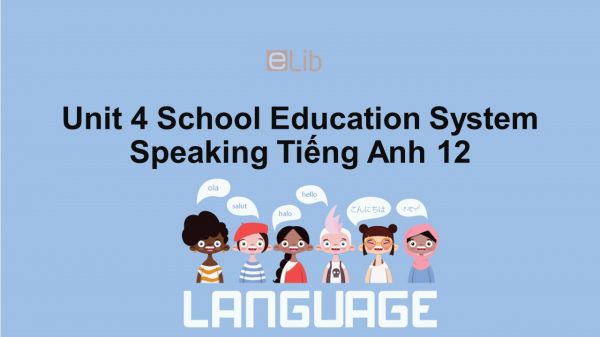Unit 4 lớp 12: School Education System-Speaking
Bài học Unit 4 Lớp 12 School Education System phần Speaking giúp các em có thêm thông tin và hiểu biết về hệ thống giáo dục Việt Nam. Qua đó, giúp các em so sánh được những điểm giống và khác nhau giữa hệ thống giáo dục ở Việt Nam và hệ thống giáo dục Anh đã học từ bài trước.
Mục lục nội dung

1. Task 1 Speaking Unit 4 lớp 12
Work in pairs. Study the table below then ask and answer the questions about the school education system in Vietnam (Làm việc từng đôi. Nghiên cứu bảng dưới đây và sau đó hỏi và trả lời những câu hỏi về hệ thống giáo dục ở nhà trường ở Việt Nam.
Example
A: When do the children in Vietnam go to primary school?
B: When they are 6 years old.
A: How long does the primary education last?
B: 5 years.
Guide to answer
A: When do small children in Vietnam go to nurseries?
B: Usually at the age of 3.
A: How long is the pre-school stage ?
B: In principle 3 years, but it depends.
A: You mean it's according to the child’s ability?
B: Right.
A: When do children start the primary education?
B: At the age of 6.
A: Well. Can children start their primary education before 6 if they have enough capacity? I mean they can read and write even at the age of five.
B: I’m afraid they cannot, in principle.
A: Oh! What's the level of education after the primary education?
B: It's the Secondary education. And this level is divided into two stages: lower and upper secondary schools.
A: Is there any exam between these two stages?
B: Yes. To enter the upper secondary schools, students must take the recruitment exam.
A: How long is normally the secondary education?
B: Seven years.
A: At the end of the upper secondary education do students have to take any exams?
B: Sure. They must take an exam called "Tu Tai" Diploma.
A: I see. One more question. Must students pay tuition fee for their study in state schools?
B: Certainly they must. They must pay tuition fee for every stage of education and some additional fees.
A: Oh, really? Thank you for your answers.
B: My pleasure.
Tạm dịch
A: Khi nào trẻ em ở Việt Nam học trường mầm non ?
B: Thường vào lúc 3 tuổi.
A: Giai đoạn mầm non kéo dài bao lâu?
B: Theo nguyên tắc khoảng 3 năm, nhưng nó còn tùy.
A. Ý bạn là nó tùy thuộc vào khả năng của đứa trẻ?
B: Đúng rồi.
A: Khi nào trẻ em bắt đầu học tiểu học?
B: Khi 6 tuổi.
A: Trẻ em có thể bắt đầu học tiểu học trước 6 nếu trẻ có đủ năng lực? Tôi có nghĩa là họ có thể đọc và viết ngay cả khi năm tuổi.
B: Về cơ bản, tôi sợ rằng chúng không thể.
A: Oh! Bậc học sau tiểu học là gì?
B: Đó là giáo dục trung học. Và cấp học này được chia thành hai giai đoạn: trường trung học cơ sở và trung học phổ thông.
A: Có kỳ thi giữa hai giai đoạn này không?
B: Có. Để vào các trường trung học phổ thông, học sinh phải tham gia kỳ thi tuyển.
A: Giáo dục trung học kéo dài bao lâu?
B: Bảy năm.
A: Khi kết thúc chương trình trung học phổ thông, học sinh phải làm bài kiểm tra nào không?
B: Chắc chắn có. Họ phải làm một bài kiểm tra được gọi là Bằng Tú Tài.
A: Tôi hiểu rồi. Một câu hỏi nữa. Học sinh phải đóng học phí khi học ở các trường công lập không?
B: Chắc chắn có. Họ phải đóng học phí cho từng giai đoạn giáo dục và một số khoản phí bổ sung.
A: Oh, vậy à? Cảm ơn bạn đã trả lời câu hỏi của mình.
B: Niềm vinh hạnh của tôi mà.
2. Task 2 Speaking Unit 4 lớp 12
Work in groups. Talk about the school education system in Vietnam, using the information from Task 1 (Làm việc nhóm. Hãy nói về hệ thống giáo dục ở Việt Nam, sử dụng thông tin từ Bài tập 1)
Guide to answer
In Vietnam, the pre-school period is completly optional. Children can either go to nursery, kindergarten or not.
However, going to primary and secondary schools is surely compulsory. They go to primary school at the age of 6 and it takes them 5 years. Later, they go to lower secondary school when they are 11. They attend lower secondary for 4 years. At the age of 15, they go to upper secondary school and it lasts 3 years. After finishing secondary education, they take the National examination for GCSE.
3. Task 3 Speaking Unit 4 lớp 12
Work in groups. Talk about the similarities and differences between the school system In Vietnam and that in England (Làm việc từng nhóm. Nói về sự tương đồng và khác biệt giữa hệ thống trường học ở Việt Nam và hệ thống trường học ở Anh)
Guide to answer
A: I’m not sure, but I think there are certain similarities and differences between the school system in Vietnam and that in England.
B: I think so. But what differences do you know?
C: As I know, first both systems have the same three levels of education, and the starting age of schooling.
D: But in England, as I know, there isn’t such a strict and unreasonable rule of starling age of schooling.
A: What do you mean?
D: OK. As I'm told, in England a pupil can attend a class if he or she has enough capacity as required.
B: About the differences I see there are a lot.
C: For example?
B: The academic year. In Vietnam there are only two periods of schooling in a year, each of which lasts about five months or so.
A: I see. In England an academic year is divided into three by season.
D: And one more difference: in England students needn’t take any exam to enter the upper secondary schools.
C: But we should not ignore the most major difference: the tuition fee for nursery, primary and secondary educations. For these three levels, people do not pay any tuition in England. I mean they are totally free and compulsory.
B: Oh, really?
Tạm dịch
A: Tôi không chắc, nhưng tôi nghĩ có một số điểm tương đồng và khác biệt nhất định giữa hệ thống trường học ở Việt Nam và ở Anh.
B: Tôi cũng nghĩ thế. Nhưng bạn có biết điểm khác biệt là gì không?
C: Như tôi biết, đầu tiên cả hai hệ thống đều có cùng ba cấp giáo dục, và độ tuổi bắt đầu đi học.
D: Nhưng ở nước Anh, như tôi biết, không có quy tắc nghiêm ngặt và không hợp lý về độ tuổi đi học.
A: Ý bạn là gì?
D: À. Tôi được bảo rằng, ở Anh, một học sinh có thể tham gia một lớp học nếu bạn ấy có đủ năng lực theo yêu cầu.
B: Về những khác biệt tôi thấy có rất nhiều.
C: Ví dụ như?
B: Năm học. Ở Việt Nam chỉ có hai học kỳ trong một năm, mỗi năm chỉ kéo dài khoảng 5 tháng.
A: Tôi hiểu rồi. Ở Anh một năm học được chia thành ba học kỳ theo mùa.
D: Một sự khác biệt nữa: ở Anh, sinh viên không cần phải tham gia kỳ thi để vào các trường trung học phổ thông.
C: Nhưng chúng ta không nên bỏ qua sự khác biệt lớn nhất: học phí cho giáo dục tiểu học, tiểu học và trung học. Đối với ba cấp độ này, mọi người không trả học phí ở Anh. Ý tôi là họ hoàn toàn miễn phí và bắt buộc.
B: Ồ vậy à?
4. Practice Task 1
Choose the best answer (Chọn câu trả lời đúng nhất)
1. School system in England is divided into two_______ consisting of the state and the public ones.
A. levels B. schools C. years D. categories
2. The state school system in England has two _______ of education: primary education and secondary education.
A. levels B. subjects C. terms D. semesters
3. The National _______ is set by the Government and must be followed by in all state schools.
A. Stadium B. Curriculum C. Gallery D. Circus
4. In English schools, English, Math and Science are_______ subjects.
A. more B. store C. score D. core
5. Core subjects in Vietnamese schools_______ of Math, Literature and English.
A. makes for B. makes of C. are made up D. will make by
5. Practice Task 2
Choose the best answer (Chọn câu trả lời đúng nhất)
1. Core subjects are _______ in national exams at certain stages of the school education system.
A. paid for B. compulsory C. score D. core
2. When do children in Vietnam go to _______? – They begin to go to school at the age of six.
A. High School B. Nursery C. Secondary School D. Primary School
3. How long does the _______ in Vietnam last? – Five years.
A. Primary Education B. Pre-school C. Secondary Education D. Higher Education
4. How long does the _______ in England last? – Five years.
A. Primary Education B. Pre-school C. Secondary Education D. Higher Education
5. In England, school fee in state schools is _______.
A. on sale B. free-paying C. well-paid D. for rent
Để nắm được cách phát âm và nhấn âm trong các từ khác nhau nhằm nâng cao hiệu quả của bài nói, mời các em đến với phần trắc nghiệm Unit 4 Speaking Tiếng Anh 12 và cùng luyện tập.
7. Conclusion
Qua bài học này, các em cần ghi nhớ một số từ vựng quan trọng trong bài học như sau
- kindergarten ['kində,gɑtn] (n): mẫu giáo
- lower secondary school (n): trường trung học cơ sở
- upper secondary school (n): trường trung học phổ thông
- nursery school ['nɜrsərɪ] (n): nhà trẻ
- optional ['ɔp∫ənl](adj): tự chọn, không bắt buộc
- to last [læst] (v): kéo dài
Tham khảo thêm
- doc Unit 4 lớp 12: School Education System-Reading
- doc Unit 4 lớp 12: School Education System-Listening
- doc Unit 4 lớp 12: School Education System-Writing
- doc Unit 4 lớp 12: School Education System-Language Focus



